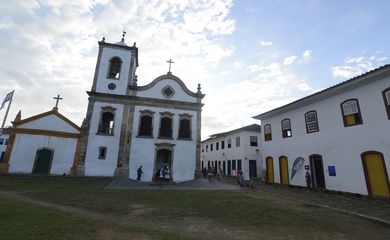Brazilian writers from the periphery struggle to make a living


Jéssica Oliveira, from Nova Iguaçu; Márcio du Coqueiral, from Aracaju; and Dielo Moraes, from Manaus, answered questions by writer Marçal Aquino and said they refuse to be discouraged by the challenges in making a living as authors. 

This Friday (Jul. 1), the 14th Paraty International Literary Festival, or Flip, brought together authors from three different Brazilian peripheries to talk about the obstacles they face and how their backgrounds are made manifest in their work. Jéssica Oliveira, from Nova Iguaçu; Márcio du Coqueiral, from Aracaju; and Dielo Moraes, from Manaus, answered questions by writer Marçal Aquino and said they refuse to be discouraged by the challenges in making a living as authors.
Listening to stories
Jéssica Oliveira's short writings are often inspired by the stories she hears in the three hours she spends commuting to downtown Rio de Janeiro everyday. Her biggest source of subjects to write about, however, is her 86-year old grandma. “who can't read or write her own name,” she says.
The author says she first wanted to write when a teacher recommended books written by people from her city. “When I talk about Rio de Janeiro, I can choose which Rio de Janeiro I'll be talking about. I live in Morro Agudo, the outskirts of the outskirts.”
She questions the belief that writers are only legitimate if their work has been published on paper, and argues that financial difficulties are not going to stop her from writing. “If there's money, good. If there isn't, I'm still going to write.”
Novels taken away by a flood
Márcio du Coqueiral, born in a country town in the northeastern state of Sergipe state, lives now in the capital Aracaju, and refrained from writing for two years after he lost everything in his house in a flood, including two finished novels and a third in the making. With the few texts he managed to salvage, he put together a book called O que sobrou da Enchente (What Was Left After the Flood, in a literal English translation).
Du Coqueiral, father of two girls and currently unemployed, works as a freelancer, writing the memoirs of a lawyer from his town, and never says no to physically straining jobs to pay his bills, and sees no problem with that. “I work with literature just as a doctor does his job during war—using whatever tools are at hand.”
By displaying his short texts on buses, bread sacks, and other unusual spots, he plans to give people a chance “to spare a minute to read it.”
“Manaus is made of asphalt and it bleeds”
Despite living in Manaus, in Amazonas state, Diego Moraes says his writing has nothing to do with the traditional legends from the Amazon. “My Manaus is made of asphalt, and it bleeds,” he says, adding that “the idea that you belong to a place is nonsense. Writing can have an endless passport; it can be forever cosmopolitan,” Moraes says.
After living as a homeless person for a year and recovering from a cocaine addiction, he says literature eases his pain. “Literature is my refuge and my fortress. Literature is where I have orgasms; it's where I'm aroused,” says Moraes, who prides himself in knowing his literature draws the interest of young people from the outskirts of town, including those recruited by crime gangs. “I see boys who were working in drug trafficking now following me. What can be better than that?”
In Diego Moraes's opinion, writers should not expect anything from anyone. “All that's coming down from the sky is pigeon shit and rain,” he says. He is now preparing his first book and says: “Here comes a blow!”
Translated by Fabrício Ferreira
Fonte: Brazilian writers from the periphery struggle to make a living



